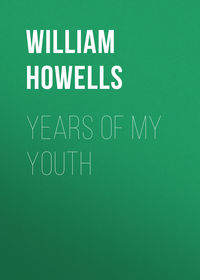 полная версия
полная версияThe Daughter of the Storage
The amigo had a mimic gift which he liked to exercise when he could find no intelligible language for the expression of his ironic spirit. Being forbidden visits in and out of season to certain staterooms whose inmates feigned a wish to sleep, he represented in what grotesque attitudes of sonorous slumber they passed their day, and he spared neither age nor sex in these graphic shows. When age refused one day to go up on deck with him and pleaded in such Spanish as it could pluck up from its past studies that it was too old, he laughed it to scorn. "You are not old," he said. "Why?" the flattered dotard inquired. "Because you smile," and that seemed reason enough for one's continued youth. It was then that the amigo gave his own age, carefully telling the Spanish numerals over, and explaining further by holding up both hands with one finger shut in. But he had the subtlety of centuries in his nine years, and he penetrated the ship everywhere with his arch spirit of mischief. It was mischief always in the interest of the good-fellowship which he offered impartially to old and young; and if it were mere frolic, with no ulterior object, he did not care at all how old or young his playmate was. This endeared him naturally to every age; and the little blond German-American boy dried his tears from the last accident inflicted on him by the amigo to recall him by tender entreaties of "Span-yard, Span-yard!" while the eldest of his friends could not hold out against him more than two days in the strained relations following upon the amigo's sweeping him down the back with a toy broom employed by the German-American boy to scrub the scuppers. This was not so much an injury as an indignity, but it was resented as an indignity, in spite of many demure glances of propitiation from the amigo's ironical eyes and murmurs of inarticulate apology as he passed.
He was, up to a certain point, the kindest and truest of amigos; then his weird seizure came, and the baby was spilled out of the carriage he had been so benevolently pushing up and down; or the second officer's legs, as he walked past with the prettiest girl on board, were hit with the stick that the amigo had been innocently playing shuffle-board with; or some passenger was taken unawares in his vanity or infirmity and made to contribute to the amigo's passion for active amusement.
At this point I ought to explain that the amigo was not traveling alone from Ecuador to Paris, where it was said he was to rejoin his father. At meal-times, and at other rare intervals, he was seen to be in the charge of a very dark and very silent little man, with intensely black eyes and mustache, clad in raven hues from his head to the delicate feet on which he wore patent-leather shoes. With him the amigo walked gravely up and down the deck, and behaved decorously at table; and we could not reconcile the apparent affection between the two with a theory we had that the amigo had been found impossible in his own country, and had been sent out of Ecuador by a decree of the government, or perhaps a vote of the whole people. The little, dark, silent man, in his patent-leather boots, had not the air of conveying a state prisoner into exile, and we wondered in vain what the tie between him and the amigo was. He might have been his tutor, or his uncle. He exercised a quite mystical control over the amigo, who was exactly obedient to him in everything, and would not look aside at you when in his keeping. We reflected with awe and pathos that, as they roomed together, it was his privilege to see the amigo asleep, when that little, very kissable black head rested innocently on the pillow, and the busy brain within it was at peace with the world which formed its pleasure and its prey in waking.
It would be idle to represent that the amigo played his pranks upon that shipload of long-suffering people with final impunity. The time came when they not only said something must be done, but actually did something. It was by the hand of one of the amigo's sweetest and kindest friends, namely, that elderly captain, off duty, who was going out to be assigned his ship in Hamburg. From the first he had shown the affectionate tenderness for the amigo which was felt by all except some obdurate hearts at the conversational end of the table; and it must have been with a loving interest in the amigo's ultimate well-being that, taking him in an ecstasy of mischief, he drew the amigo face downward across his knees, and bestowed the chastisement which was morally a caress. He dismissed him with a smile in which the amigo read the good understanding that existed unimpaired between them, and accepted his correction with the same affection as that which had given it. He shook himself and ran off with an enjoyment of the joke as great as that of any of the spectators and far more generous.
In fact there was nothing mean in the amigo. Impish he was, or might be, but only in the sort of the crow or the parrot; there was no malevolence in his fine malice. One fancied him in his adolescence taking part in one of the frequent revolutions of his continent, but humorously, not homicidally. He would like to alarm the other faction, and perhaps drive it from power, or overset it from its official place, but if he had the say there would be no bringing the vanquished out into the plaza to be shot. He may now have been on his way to France ultimately to study medicine, which seems to be preliminary to a high political career in South America; but in the mean time we feared for him in that republic of severely regulated subordinations.
We thought with pathos of our early parting with him, as we approached Plymouth and tried to be kodaked with him, considering it an honor and pleasure. He so far shared our feeling as to consent, but he insisted on wearing a pair of glasses which had large eyes painted on them, and on being taken in the act of inflating a toy balloon. Probably, therefore, the likeness would not be recognized in Bogotá, but it will always be endeared to us by the memory of the many mockeries suffered from him. There were other friends whom we left on the ship, notably those of the conversational end of the table, who thought him simply a bad boy; but there were none of such peculiar appeal as he, when he stood by the guard, opening and shutting his hand in ironical adieu, and looking smaller and smaller as our tender drifted away and the vast liner loomed immense before us. He may have contributed to its effect of immensity by the smallness of his presence, or it may have dwarfed him. No matter; he filled no slight space in our lives while he lasted. Now that he is no longer there, was he really a bad little boy, merely and simply? Heaven knows, which alone knows good boys from bad.
XII BLACK CROSS FARM
(To F. S.)After full many a mutual delayMy friend and I at last fixed on a dayFor seeing Black Cross Farm, which he had longBoasted the fittest theme for tale or songIn all that charming region round about:Something that must not really be left outOf the account of things to do for me.It was a teasing bit of mystery,He said, which he and his had tried in vain,Ever since they had found it, to explain.The right way was to happen, as they did,Upon it in the hills where it was hid;But chance could not be always trusted, quite,You might not happen on it, though you might;Encores were usually objected toBy chance. The next best thing that we could doWas in his carryall, to start together,And trust that somehow favoring wind and weather,With the eccentric progress of his horse,Would so far drift us from our settled courseThat we at least could lose ourselves, if notFind the mysterious object that we sought.So one blithe morning of the ripe JulyWe fared, by easy stages, toward the skyThat rested one rim of its turquoise cupLow on the distant sea, and, tilted up,The other on the irregular hilltops. SweetThe sun and wind that joined to cool and heatThe air to one delicious temperature;And over the smooth-cropt mowing-pieces pureThe pine-breath, borrowing their spicy scentIn barter for the balsam that it lent!And when my friend handed the reins to me,And drew a fuming match along his knee,And, lighting his cigar, began to talk,I let the old horse lapse into a walkFrom his perfunctory trot, content to listen,Amid that leafy rustle and that glistenOf field, and wood, and ocean, rapt afar,From every trouble of our anxious star.From time to time, between effect and causeIn this or that, making a questioning pause,My friend peered round him while he feigned a gayHope that we might have taken the wrong wayAt the last turn, and then let me push on,Or the old horse rather, slanting hither and yon,And never in the middle of the track,Except when slanting off or slanting back.He talked, I listened, while we wandered byThe scanty fields of wheat and oats and rye,With patches of potatoes and of corn,And now and then a garden spot forlorn,Run wild where once a house had stood, or whereAn empty house yet stood, and seemed to stareUpon us blindly from the twisted glassOf windows that once let no wayfarer passUnseen of children dancing at the pane,And vanishing to reappear again,Pulling their mother with them to the sight.Still we kept on, with turnings left and right,Past farmsteads grouped in cheerful neighborhoods,Or solitary; then through shadowy woodsOf pine or birch, until the road, grass-grown,Had given back to Nature all her ownSave a faint wheel-trace, that along the slope,Rain-gullied, seemed to stop and doubt and grope,And then quite ceased, as if 't had turned and fledOut of the forest into which it led,And left us at the gate whose every barWas nailed against us. But, "Oh, here we are!"My friend cried joyously. "At last, at last!"And making our horse superfluously fast,He led the way onward by what had beenA lane, now hid by weeds and briers betweenMeadows scarce worth the mowing, to a spaceShaped as by Nature for the dwelling-placeOf kindly human life: a small plateauOpen to the heaven that seemed bending lowIn liking for it. There beneath a roofStill against winter and summer weather-proof,With walls and doors and windows perfect yet,Between its garden and its graveyard set,Stood the old homestead, out of which had perishedThe home whose memory it dumbly cherished,And which, when at our push the door swung wide,We might have well imagined to have diedAnd had its funeral the day before:So clean and cold it was from floor to floor,So lifelike and so deathlike, with the thrillOf hours when life and death encountered stillPassionate in it. They that lay belowThe tangled grasses or the drifted snow,Husband and wife, mother and little one,From that sad house less utterly were goneThan they that living had abandoned it.In moonless nights their Absences might flit,Homesick, from room to room, or dimly sitAround its fireless hearths, or haunt the roseAnd lily in the neglected garden close;But they whose feet had borne them from the doorWould pass the footworn threshold nevermore.We read the moss-grown names upon the tombs,With lighter melancholy than the gloomsOf the dead house shadowed us with, and thenceTurning, my heart was pierced with more intenseSuggestion of a mystical dismay,As in the brilliance of the summer dayWe faced the vast gray barn. The house was old,Though so well kept, as age by years is toldIn our young land; but the barn, gray and vast,Stood new and straight and strong – all battened fastAt every opening; and where once the mowHad yawned wide-windowed, on the sheathing nowA Cross was nailed, the bigness of a man,Aslant from left to right, athwart the span,And painted black as paint could make it. Hushed,I stood, while manifold conjecture rushedTo this point and to that point, and then burstIn the impotent questionings rejected first.What did it mean? Ah, that no one could tell.Who put it there? That was unknown as well.Was there no legend? My friend knew of none.No neighborhood story? He had sought for oneIn vain. Did he imagine it accident,With nothing really implied or meantBy the boards set in that way? It might be,But I could answer that as well as he.Then (desperately) what did he guess it was:Something of purpose, or without a causeOther than chance? He slowly shook his head,And with his gaze fixed on the symbol said:"We have quite ceased from guessing or surmising,For all our several and joint devisingHas left us finally where I must leave you.But now I think it is your part to doYourself some guessing. I hoped you might bringA fresh mind to the riddle's unraveling.Come!"And thus challenged I could not denyThe sort of right he had to have me try;And yielding, I began – instinctivelyProceeding by exclusion: "We agreeIt was not put there as a pious charmTo keep the abandoned property from harm?The owner could have been no Catholic;And yet it was no sacrilegious trickTo make folks wonder; and it was not chanceAssuredly that set those boards askanceIn that shape, or before or after, soPainted them to that coloring of woe.Do you suppose, then, that it could have beenSome secret sorrow or some secret sin,That tried to utter or to expiateItself in that way: some unhappy hateTurned to remorse, or some life-rending griefThat could not find in years or tears relief?Who lived here last?""Ah," my friend made reply,"You know as much concerning that as I.All I could tell is what those gravestones tell,And they have told it all to you as well.The names, the dates, the curious epitaphsAt whose quaint phrase one either sighs or laughs,Just as one's heart or head happens to beHollow or not, are there for each to see.But I believe they have nothing to reveal:No wrong to publish, no shame to conceal.""And yet that Cross!" I turned at his reply,Fixing the silent symbol with my eye,Insistently. "And you consent," I said,"To leave the enigma uninterpreted?""Why, no," he faltered, then went on: "SupposeThat some one that had known the average woesOf human nature, finding that the loadWas overheavy for him on life's road,Had wished to leave some token in this Cross,Of what had been his gain and been his loss,Of what had been his suffering and of whatHad also been the solace of his lot?Whoever that unknown brother-man might be,I think he must have been like you and me,Who bear our Cross, and when we fail at length,Bow down and pray to it for greater strength."I mused, and as I mused, I seemed to findThe fancy more and still more to my mind."Well, let it go at that! I think, for me,I like that better than some tragedyOf clearer physiognomy, which wereIn being more definite the vulgarer.For us, what, after all, would be the gainOf making the elusive meaning plain?I really think, if I were you and yours,I would not lift the veil that now obscuresThe appealing fact, lest I should spoil the charmDeeding me for my own the Black Cross Farm.""A good suggestion! I am glad," said he,"We have always practised your philosophy."He smiled, we laughed; we sighed and turned away,And left the mystery to the summer dayThat made as if it understood, and couldHave read the riddle to us if it would:The wide, wise sky, the clouds that on the grassLet their vague shadows dreamlike trail and pass;The conscious woods, the stony meadows growingUp to birch pastures, where we heard the lowingOf one disconsolate cow. All the warm afternoon,Lulled in a reverie by the myriad tuneOf insects, and the chirp of songless birds,Forgetful of the spring-time's lyric words,Drowsed round us while we tried to find the laneThat to our coming feet had been so plain,And lost ourselves among the sweetfern's growth,And thickets of young pine-trees, nothing loath,Amidst the wilding loveliness to stray,And spend, if need were, looking for the way,Whole hours; but blundered into the right courseSuddenly, and came out upon our horse,Where we had left him – to our great surprise,Stamping and switching at the pestering flies,But not apparently anxious to depart,When nearly overturning at the start,We followed down that evanescent traceWhich, followed up, had brought us to the place.Then, all the wayside scenes reversing, weDropped to the glimpses of the distant sea,Content as if we brought, returning thus,The secret of the Black Cross back with us.XII
THE CRITICAL BOOKSTORE
It had long been the notion of Frederick Erlcort, who held it playfully, held it seriously, according to the company he was in, that there might be a censorship of taste and conscience in literary matters strictly affiliated with the retail commerce in books. When he first began to propose it, playfully, seriously, as his listener chose, he said that he had noticed how in the great department stores where nearly everything to supply human need was sold, the shopmen and shopwomen seemed instructed by the ownership or the management to deal in absolute good faith with the customers, and not to misrepresent the quality, the make, or the material of any article in the slightest degree. A thing was not to be called silk or wool when it was partly cotton; it was not to be said that it would wash when it would not wash, or that the color would not come off when it would come off, or that the stuff was English or French when it was American.
When Erlcort once noted his interest in the fact to a floor-walker whom he happened to find at leisure, the floor-walker said, Yes, that was so; and the house did it because it was business, good business, the only good business. He was instantly enthusiastic, and he said that just in the same way, as an extension of its good faith with the public, the house had established the rule of taking back any article which a customer did not like, or did not find what she had supposed when she got it home, and refunding the money. This was the best sort of business; it held custom; the woman became a customer for life. The floor-walker laughed, and after he had told an anxious applicant, "Second aisle to the left, lady; three counters back," he concluded to Erlcort, "I say she because a man never brings a thing back when he's made a mistake; but a woman can always blame it on the house. That so?"
Erlcort laughed with him, and in going out he stopped at the book-counter. Rather it was a bookstore, and no small one, with ranks of new books covering the large tables and mounting to their level from the floor, neatly piled, and with shelves of complete editions and soberer-looking volumes stretching along the wall as high as the ceiling. "Do you happen to have a good book – a book that would read good, I mean – in your stock here?" he asked the neat blonde behind the literary barricade.
"Well, here's a book that a good many are reading," she answered, with prompt interest and a smile that told in the book's favor; it was a protectingly filial and guardedly ladylike smile.
"Yes, but is it a book worth reading – worth the money?"
"Well, I don't know as I'm a judge," the kind little blonde replied. She added, daringly, "All I can say is, I set up till two last night to finish it."
"And you advise me to buy it?"
"Well, we're not allowed to do that, exactly. I can only tell you what I know."
"But if I take it, and it isn't what I expected, I can return it and get my money back?"
"That's something I never was asked before. Mr. Jeffers! Mr. Jeffers!" she called to a floor-walker passing near; and when he stopped and came up to the counter, she put the case to him.
He took the book from Erlcort's hand and examined the outside of it curiously if not critically. Then he looked from it to Erlcort, and said, "Oh, how do you do again! Well, no, sir; I don't know as we could do that. You see, you would have to read it to find out that you didn't want it, and that would be like using or wearing an article, wouldn't it? We couldn't take back a thing that had been used or worn – heigh?"
"But you might have some means of knowing whether a book is good or not?"
"Well, yes, we might. That's a point we have never had raised before. Miss Prittiman, haven't we any means of knowing whether a book's something we can guarantee or not?"
"Well, Mr. Jeffers, there's the publisher's advertisement."
"Why, yes, so there is! And a respectable publisher wouldn't indorse a book that wasn't the genuine article, would he now, sir?"
"He mightn't," Erlcort said, as if he felt the force of the argument.
"And there are the notices in the newspapers. They ought to tell," Miss Prittiman added, more convincingly. "I don't know," she said, as from a sensitive conscience, "whether there have been any about this book yet, but I should think there would be."
"And in the mean time, as you won't guarantee the book so that I can bring it back and get my money if I find it worthless, I must accept the publisher's word?" Erlcort pressed further.
"I should think you could do that," the floor-walker suggested, with the appearance of being tired.
"Well, I think I will, for once," Erlcort relented. "But wait! What does the publisher say?"
"It's all printed on this slip inside," the blonde said, and she showed it as she took the book from him. "Shall I send it? Or will you – "
"No, no, thank you, I'll take it with me. Let me – "
He kept the printed slip and began to read it. The blonde wrapped the book up and laid it with a half-dollar in change on the counter before Erlcort. The floor-walker went away; Erlcort heard him saying, "No, madam; toys on the fifth floor, at the extreme rear, left," while he lost himself in the glowing promises of the publisher. It appeared that the book he had just bought was by a perfectly new author, an old lady of seventy who had never written a novel before, and might therefore be trusted for an entire freshness of thought and feeling. The plot was of a gripping intensity; the characters were painted with large, bold strokes, and were of an unexampled virility; the story was packed with passion from cover to cover; and the reader would be held breathless by the author's skill in working from the tragic conditions to an all-round happy conclusion.
From time to time Erlcort heard the gentle blonde saying such things as, "Oh yes; it's the best-seller, all right," and, "All I can say is I set up till two o'clock in the morning to finish it," and, "Yes, ma'am; it's by a new writer; a very old lady of seventy who is just beginning to write; well, that's what I heard."
On his way up-town in the Subway he clung to the wonted strap, unsupported by anything in the romance which he had bought; and yet he could not take the book back and get his money, or even exchange it for some article of neckwear or footwear. In his extremity he thought he would try giving it to the trainman just before he reached his stop.
"You want to give it to me? Well, that's something that never happened to me on this line before. I guess my wife will like it. I —1009th Street! Change for East Brooklyn and the Bronx!" the guard shouted, and he let Erlcort out of the car, the very first of the tide that spilled itself forth at the station. He called after him, "Do as much for you some time."
The incident first amused Erlcort, and then it began to trouble him; but he appeased his remorse by toying with his old notion of a critical bookstore. His mind was still at play with it when he stopped at the bell-pull of an elderly girl of his acquaintance who had a studio ten stories above, and the habit of giving him afternoon tea in it if he called there about five o'clock. She had her ugly painting-apron still on, and her thumb through the hole in her palette, when she opened her door to him.
"Too soon?" he asked.
She answered as well as she could with the brush held horizontally in her mouth while she glared inhospitably at him. "Well, not much," and then she let him in, and went and lighted her spirit-lamp.
He began at once to tell her of his strange experience, and went on till she said: "Well, there's your tea. I don't know what you've been driving at, but I suppose you do. Is it the old thing?"
"It's my critical bookstore, if that's what you call the old thing."
"Oh! That! I thought it had failed 'way back in the dark ages."
"The dark ages are not back, please; they're all 'round, and you know very well that my critical bookstore has never been tried yet. But tell me one thing: should you wish to live with a picture, even for a few hours, which had been painted by an old lady of seventy who had never tried to paint before?"
"If I intended to go crazy, yes. What has all that got to do with it?"









